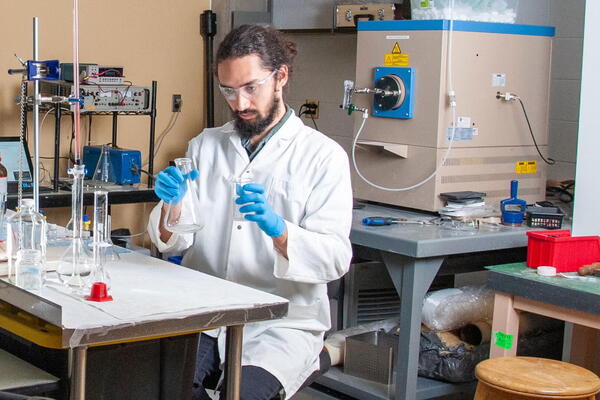
Beating the heat without warming the planet
Evercloak raises $2 million to scale production of its first clean-tech product

Evercloak raises $2 million to scale production of its first clean-tech product
By Naomi Grosman VelocityThere’s an irony to air conditioning.
Traditional air conditioners condense water out of the air, a very energy-intensive process which pumps greenhouse gases into the environment. So, as we cool our indoors, we heat the climate even more.
Velocity-based company Evercloak can break this cycle. The clean-tech startup has raised $2 million from Bioindustrial Innovation Canada, Greensoil Proptech Ventures, GroundBreak Ventures, Ontario Centre for Innovation (OCI) and angel investors.
“Everyone has experienced the effects of the warming climate and I’m so excited that Evercloak can really have an impact on how people are cooling their homes and workplaces,” says Evelyn Allen, co-founder and CEO. “We can support integration of new technologies that remove humidity out of indoor spaces much more efficiently than traditional methods.”
Evercloak plans to scale up production of its membranes to enable energy efficient building cooling. Due to their membranes’ unique properties, water vapour can be removed from the air without having to condense it — unlike today's refrigerant-based technology — making cooling more efficient.
“Through the Ontario Centre of Innovation, our government is helping growing Ontario innovators, like Evercloak, bring made-in-Ontario solutions to market,” says Vic Fedeli, Ontario’s Minister of Economic Development, Job Creation and Trade. “We congratulate Evercloak on the success of their cutting-edge cooling technology and look forward to supporting their growth, as they continue to advance our innovation ecosystem and create good-paying jobs in the cleantech sector.”
Evercloak is focused on scaling up the production and distribution of its membranes. By developing a way to manufacture graphene composite membranes at scale, Evercloak has turned the theoretical potential of membrane-based dehumidification into a viable commercial option. In summer 2023, field trials of two demonstration units proved how well they perform. Now, the company is preparing to bring their solution to the market.
"At the Ontario Centre of Innovation, we are proud to invest in groundbreaking ventures like Evercloak. Their innovative approach to cooling technology not only promises energy efficiency but also aligns perfectly with our mission of fostering sustainable solutions for a brighter future. Evercloak's success reflects our commitment to supporting innovative endeavors that have the potential to make a significant impact on both environmental sustainability and economic growth,” says Claudia Krywiak, President and CEO of the Ontario Centre of Innovation (OCI).

Dr. Michael Pope (left), co-founder and chief scientific officer, and Evelyn Allen, co-founder and CEO of Evercloak.
Evercloak’s technology was created out of University of Waterloo research led by Evercloak’s co-founder and chief scientific officer, Dr. Michael Pope.
Allen says coming from Waterloo research, it made sense to join Velocity and get business support and access to resources that deep tech companies need to grow fast.
Since joining Velocity, Evercloak has raised a pre-seed round and secured a variety of grants, hired full-time staff and continues to recruit talent through Waterloo’s co-op program.
“Being at Velocity has been very valuable to get the support and access to resources we need, while having the autonomy to make decisions about what’s best for the business,” Allen says. “Being an entrepreneur gives you an opportunity to make a real difference, which is one of the reasons I started Evercloak, and Velocity has given us runway that we wouldn't have had otherwise.”

Read more
Waterloo alum Keith Cleland is changing the way industrial and commercial properties store energy sustainably with his startup's saltwater batteries

Read more
Discover how Waterloo alumni are driving Canada’s economy with five tech companies making a local and global impact

Read more
The University of Waterloo fosters innovation through bold, unconventional research, driving future-focused solutions to both local and global challenges
The University of Waterloo acknowledges that much of our work takes place on the traditional territory of the Neutral, Anishinaabeg, and Haudenosaunee peoples. Our main campus is situated on the Haldimand Tract, the land granted to the Six Nations that includes six miles on each side of the Grand River. Our active work toward reconciliation takes place across our campuses through research, learning, teaching, and community building, and is co-ordinated within the Office of Indigenous Relations.